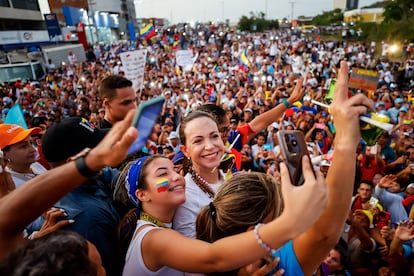Venezuela is experiencing days of turmoil over the prospect of political change
The international community is attempting to promote a last-minute agreement between Chavismo and the opposition to respect the outcome of the July 28 presidential election


In Venezuela, for the first time in 25 years, the possibility of real change has opened up. Chavismo, in power since the end of the 1990s, heads into the presidential elections of July 28 extremely weakened and, according to the most reliable polls, the opposition has a serious chance of victory. At this point, the question everyone is asking is what would happen the day after such a scenario unfolded. In the two weeks that lie ahead, the international community is encouraging both sides to sit down and sign a document pledging their commitment to respect the result, whatever it may be.
Behind this initiative are, predominantly, the presidents of Colombia and Brazil, Gustavo Petro and Lula Da Silva. Two months ago, at a meeting in Bogotá, they agreed to draw up a text that would serve as a guarantee for a possible transition in Venezuela, under which the parties would commit themselves not to encourage the specter of fraud and not to persecute their political rivals. For some, it represents a way out for Chavismo, which for the last decade has governed an economically ruined country that has experienced the largest exodus in the history of Latin America, with more than seven million migrants.
For others, the agreement prevents Chavismo’s authoritarianism, which controls all State institutions, from worsening and Venezuela from reaching a point similar to that of Nicaragua or Cuba, where there is no hint of democratic will. In the Venezuelan case, the government and the opposition have spent years negotiating a political agreement in Mexico, which was endorsed in Barbados in October last year. Under the pact, it was agreed that presidential elections would be held in the second semester of this year and that the government would allow the registration of the main opposition leaders.
The undisputed leader of the opposition
The latter point has not been fully complied with. Chavismo used its bureaucratic machinery to disqualify María Corina Machado, the undisputed leader of the opposition. Machado had swept the opposition primaries months before, winning more than 90% of the vote. Such an electoral phenomenon had not been seen in Venezuela since the emergence of Hugo Chávez in 1998. In polls, Machado clearly defeated Nicolás Maduro, the president-candidate of the ruling party. With Machado out of the race, the opposition leader — who in the past had advocated non-participation in elections in order not to validate Chavismo — remains determined to pursue the electoral route and has ceded all her political capital to Edmundo González Urrutia, a 74-year-old diplomat who until now had moved behind the scenes of power.
Maduro, his political operator Jorge Rodríguez, and the party’s vice-president Diosdado Cabello thought that with Machado out of the equation, Chavismo would have a smooth path ahead. This has not been the case: the largely unknown Urrutia is leading in the polls. His rallies, in which he is accompanied by Machado, move crowds. He acknowledges quite naturally that the leadership belongs to her and that he is only an instrument of change for the greater good. “They seriously believe they can win; they notice the people’s desire for change wherever they go,” says a source close to the candidate. “But there is a doubt as to whether Chavismo will want to let go of power, just like that. There is very little time left and this agreement of guarantees has not yet materialized.”
In addition to Petro and Lula’s attempts, the government has joined the parallel negotiation with the White House, resumed at Maduro’s expense. The Venezuelan president shocked everyone by announcing last week that he had agreed to sit down for discussions with Joe Biden’s administration, at this moment of maximum uncertainty. U.S. officials, after years of back-and-forth with Chavismo, are not very optimistic and tend to believe that this is a way to buy time. Although Chavismo holds absolute power and leaves very little room for opponents, its narrative throughout the campaign has been based on the fact that the anti-Chavistas have the support of the United States (“we are David against Goliath,” Maduro has said repeatedly), and that international sanctions, which do not allow Venezuela to sell oil or gold on the official international markets, put them at a disadvantage.
“For me, as of today, elections are not guaranteed,” says a top-level source privy to the negotiations. “Maduro can say that the conditions for fair elections do not exist and that it is better to postpone them. The polls they themselves are handling are catastrophic for their interests. They can see that the end is near, but I don’t know how ready they are to recognize it.” The suspension of the elections could happen, and it is something that is openly talked about in Venezuela even though everything is already in place. However, there are other ways to unbalance the contest. The authorities could disqualify Urrutia and leave Maduro alone against other opponents of very little weight, who are currently scoring below 3% in the polls.
It would not even be necessary to go that far: by simply removing Urrutia’s candidacy from the alliance of parties with which he is running, confusion would be compounded and voters who checked that box would lose their vote. Urrutia appears three times on that card; Maduro a total of 13. In any case, all scenarios are possible. There are those who doubt what Petro and Lula intend to do will be effective. Previous agreements, such as the one signed in Barbados, have not been respected. Why now?
Venezuela has entered unknown territory. Historians, political scientists, analysts and people on the street are equally in the dark. Forecasting carries a risk. The real challenge, many think, begins after July 28. Should the polls show a Maduro victory, the country will remain paralyzed. The United States has reversed the lifting of sanctions, and the arrival of Donald Trump in the White House would complicate things even further. Maduro, however, has spoken very harshly against his government’s management of the campaign - sometimes more harshly than the opposition itself - and has promised to put an end to corruption and sloppiness. If he were defeated and Chavismo were to acknowledge it, his place would be taken by Urrutia, who has promised an orderly, calm transition, without traumas or vindictiveness, as of January 10, 2025. He would rule from the Miraflores Palace over a country controlled almost absolutely by Chavismo, from the judiciary to the army. Some visualize this scenario; others see it as almost impossible and believe that nothing will change, although they cannot be sure of that either. Venezuela is experiencing days of political uncertainty.
Sign up for our weekly newsletter to get more English-language news coverage from EL PAÍS USA Edition
Tu suscripción se está usando en otro dispositivo
¿Quieres añadir otro usuario a tu suscripción?
Si continúas leyendo en este dispositivo, no se podrá leer en el otro.
FlechaTu suscripción se está usando en otro dispositivo y solo puedes acceder a EL PAÍS desde un dispositivo a la vez.
Si quieres compartir tu cuenta, cambia tu suscripción a la modalidad Premium, así podrás añadir otro usuario. Cada uno accederá con su propia cuenta de email, lo que os permitirá personalizar vuestra experiencia en EL PAÍS.
¿Tienes una suscripción de empresa? Accede aquí para contratar más cuentas.
En el caso de no saber quién está usando tu cuenta, te recomendamos cambiar tu contraseña aquí.
Si decides continuar compartiendo tu cuenta, este mensaje se mostrará en tu dispositivo y en el de la otra persona que está usando tu cuenta de forma indefinida, afectando a tu experiencia de lectura. Puedes consultar aquí los términos y condiciones de la suscripción digital.








































